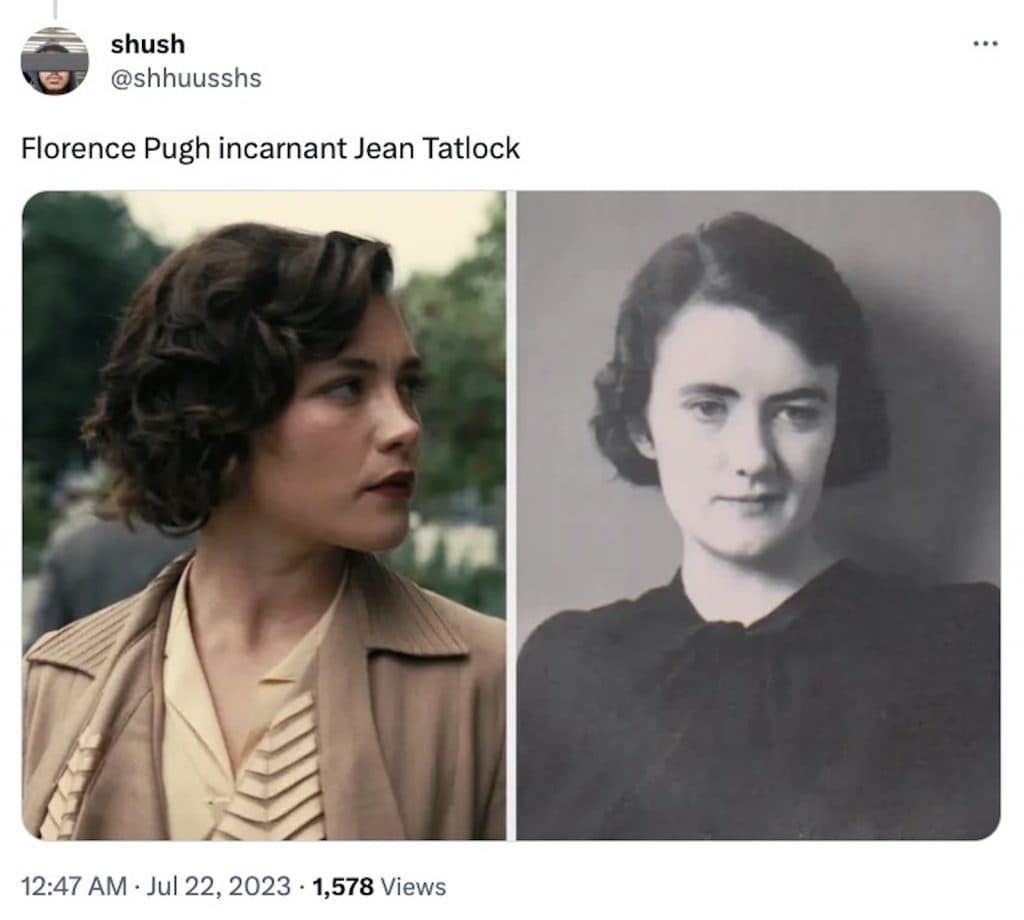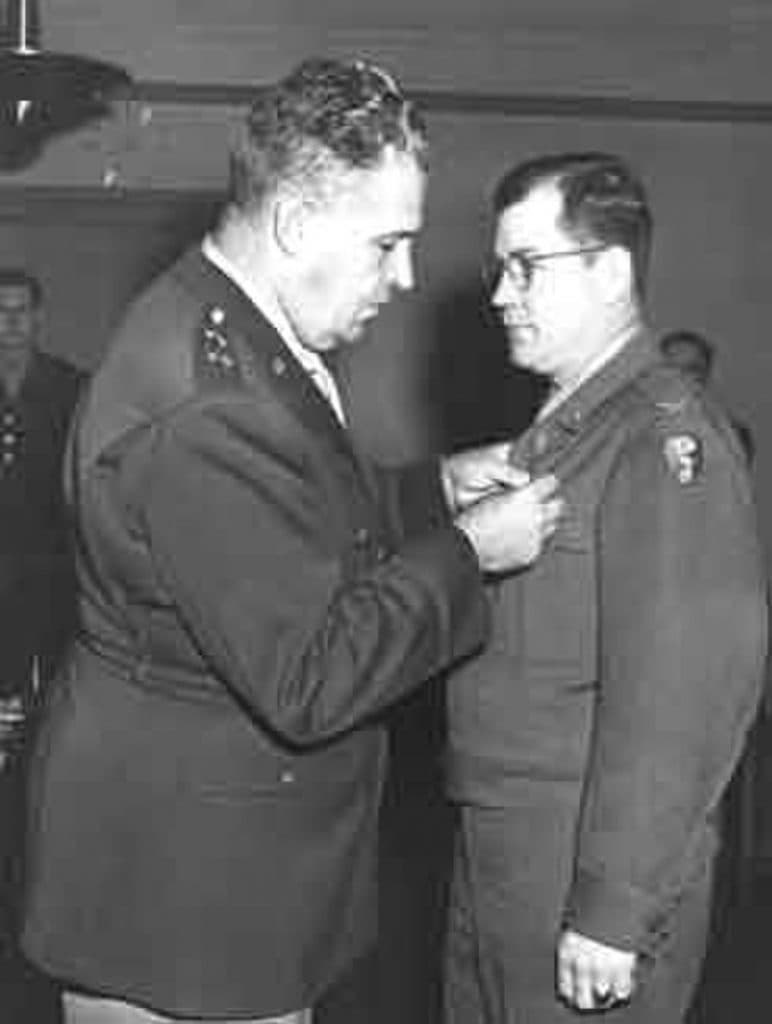Oppenheimer: Was Jean Tatlock murdered?
 Universal Pictures
Universal PicturesOppenheimer introduces us to the life of Jean Tatlock, but a major mystery remains: was she murdered?
Christopher Nolan’s latest masterpiece tells the story of the physicist who led the Manhattan Project, building up to the Trinity Test – the world’s first detonation of a nuclear weapon. But central to the plot is the complexity of Oppenheimer’s life, his political leanings, and the guilt he harbored over his own creation. “Now I am become Death,” he once uttered, “the destroyer of worlds.”
The movie also examines the two main women in his life: his wife Katherine “Kitty” Oppenheimer, and his mistress Jean Tatlock. The latter, played by Florence Pugh, was a psychiatrist and physician, one whose ties to the Communist Party came into question during Oppenheimer’s controversial security hearings.
Although her death was ruled as a suicide, there has been much speculation over the years as to whether she was murdered. Let’s explore the evidence for and against this theory. Warning: Spoilers for Oppenheimer ahead!
Oppenheimer: Was Jean Tatlock murdered?
As it stands, the history books state that Oppenheimer’s lover Jean Tatlock died by suicide after suffering clinical depression. She passed away on January 4, 1944, with a formal inquest in February reaching a verdict of “suicide, motive unknown.” But there is plenty of evidence that has led many to believe she was murdered.
Firstly, the way she died raised questions. Although she was found to have barbiturates in her system, it was not a fatal dose, and Tatlock had eaten a full meal shortly before her death – an unusual thing to do prior to suicide, especially if taking an overdose.
Additionally, an autopsy discovered traces of chloral hydrate in her system, which when mixed with alcohol, creates a “Mickey Finn” – a cocktail used to knock a person out. And then there was the fact that the cause of death was found to be asphyxiation by drowning.
A quote from An Atomic Love Story: The Extraordinary Women in Robert Oppenheimer’s Life reads: “These curious circumstances are suspicious enough – but the disturbing information contained in the autopsy report is the assertion that the coroner found ‘a faint trace of chloral hydrate’ in her system.
“If administered with alcohol, chloral hydrate is the active ingredient of what was then commonly called a ‘Mickey Finn’ – knockout drops. In short, several investigators have speculated, Jean may have been ‘slipped a Mickey,’ and then forcibly drowned in her bathtub.”
The book went on to state that while Tatlock may have taken the barbiturates and chloral hydrate in order to knock herself out in the bathtub, “on the other hand, said one doctor shown the Tatlock records, ‘If you were clever and wanted to kill someone, this is the way to do it.’”
 Twitter/@notharshraval
Twitter/@notharshravalBut what if the autopsy hadn’t been legitimate in the first place? This was the evidence uncovered by iconic screenwriter and researcher Bruce Robinson, who created his own Oppenheimer movie called Fat Man and Little Boy, which released back in 1989.
Now, to say Robinson is thorough when it comes to researching his projects is an understatement – he spent 15 years collecting the materials on the mystery of Jack the Ripper, and many believe he’s the person who cracked the age-old case.
The same level of effort went into his research on Oppenheimer for Fat Man and Little Boy, to the point where his phone was tapped and he may have even been followed after unearthing secrets about the possible US conspiracy of Tatlock’s murder and the lies told about the nuclear arms race.
To find out more about Tatlock, Robinson even traveled to Berkeley, where Tatlock had first met Oppenheimer as a graduate student. But as he says in his book Smoking in Bed, when he got there, “virtually everything relevant to her had vanished.” And so he went about ringing every person with the surname Tatlock in the US – on the 3946th call, he found her brother.
“And that was where we got the first photograph,” he wrote. “Now I’m after any and all information about this woman because I’m so suspicious. I got her autopsy reports to Professor Keith Simpson, a leading forensic pathologist in this country, and he looks at them and says, ‘These are bullsh*t.’
“If someone with the importance of Oppenheimer’s lover drowns in the bath the authorities are going to do a very detailed autopsy, because perhaps she was killed in a botched hit against Oppenheimer, by the Russians, the Germans or Christ knows who.
“Of prime importance, one of the first things you do when someone’s drowned is a thing called a diatomaceous test. Diatoms are tiny one-celled organisms that live in water, and if someone’s dead in the bath you take fluid from the lungs, the brain or whatever, and check for diatoms because maybe they were drowned in a river and slung in the bath to make it look like suicide. No diatomaceous test was done. It didn’t take long to prove that the whole autopsy was an inadequate invention.”
Next up, Robinson examined the suicide note and the psychiatrist Tatlock had supposedly been seeing for her depression. Robinson continued: “‘She’d been seeing a psychiatrist for two years because of depression,’ said the newspapers. In actual fact, she’d been seeing a psychiatrist for two years and paying to have lessons with him for her forthcoming job in Michigan.
 Twitter/@shhuusshs
Twitter/@shhuusshs“We found her friends who were still living. ‘Jean depressed? No way. She was a good-time girl. She loved life.’ Piece by piece we get to the point where, had I been the cop I would have made the arrest. The G2/FBI people had her murdered. They gave her chloralhydrate to knock her out, slung her in the bathtub, faked a note, and within a day or two – because her father was a very prominent man in the Berkeley area – there are newspaper reports talking about Jean Tatlock’s suicide.
“I’ve got a tape somewhere of me confronting Colonel Lansdale [the late CIA operative], who was now an old man, and you should hear his astonishment that someone had finally busted it.”
It’s important to note that the claim that Tatlock was murdered has never been proven as fact, but it’s also understandable why so many experts believe this to be the case. If it were true, it would be far from the first government cover-up in history.
Oppenheimer: Why would the government want Jean Tatlock dead?
Whether it happened or not, there was a clearcut motive – Jean Tatlock was a member of the Communist Party, and a reporter and writer for its publication Western Worker. Major General Leslie Groves already had his concerns about Oppenheimer when he considered him to lead the Manhattan Project due to his liberal views, and the physicist had never even joined the party.
Tatlock died at a time when Oppenheimer was deeply involved in the project. Given the high stakes and intense secrecy of Los Alamos, some theorists suggest her death may have been staged to protect US information. Oppenheimer had admitted to a close relationship with Tatlock, and even visited her in June 1943 against the advice of security officers – which could have made her a target.
Ultimately, Oppenheimer and Tatlock won Groves’ trust, but the same couldn’t be said for Colonel John Lansdale Jr., who served as head of intelligence and security for the Manhattan Project.
 Creative Commons
Creative CommonsRobinson went on to say in Smoking in Bed: “Groves knows Oppenheimer is safe; Lansdale doesn’t. Groves knows Tatlock is safe; Lansdale doesn’t. He asks, ‘Is Tatlock one of the people who approached Oppenheimer?’ Groves stonewalls, and despite the threat of a court-martial for nagging at this, what Lansdale does is override him.
“Groves, and everyone down from Groves, is controlled by G2 Security, but Jean Tatlock is a civilian, under the jurisdiction of the FBI, so Lansdale goes to J. Edgar Hoover in Washington and lays it all on him via two agents called Tamm and Whison.
“Paraphrasing him, Hoover says, ‘F*ck this. Oppenheimer is not only committing adultery, which I don’t like, but the girl is a Communist, which I don’t like even more… and we’ve got the most secret and expensive project in the history of mankind that could win us the war. This b*tch is the perfect Soviet letterbox. We’ve got to take her out.’ Four days later Jean Tatlock is dead.”
Oppenheimer: How does the movie depict her death?
Although Jean Tatlock is stated to have died by suicide in Christopher Nolan’s Oppenheimer, there is a major clue indicating it’s open to speculation. Notably, a hazy flashback scene to Tatlock in the leadup to her death shows a pair of hands with black gloves behind her.
Although it’s a brief moment, it speaks volumes about the creator’s awareness of the theories surrounding her death. And then there’s Oppenheimer’s guilt, which could be taken in one of two ways: by cutting off their romantic relationship, he pushed her to suicide; or he believes she was killed due to their ties.
 Universal Pictures
Universal PicturesIn an article for Vulture, critic Bilge Ebiri wrote: “It’s clear that Oppenheimer blames himself for Tatlock’s death. If she did indeed commit suicide, he assumes she did it over their inability to be together. It’s also possible – as hinted by a flash of a black glove pushing her head down – that she was murdered by the government over security concerns around the Manhattan Project.”
Oppenheimer is in cinemas now. You can check out our other coverage of the movie below:
Oppenheimer review | Ending explained | Epic runtime revealed | R-rating explained | Best way to watch Oppenheimer | Christopher Nolan on sex scenes | Cast and characters | Filming locations | True story explained | Is Oppenheimer streaming? | Nolan ranked by Rotten Tomato scores | Is it based on a book? | Age-gap controversy explained | Robert Pattinson’s influence | How Oppenheimer died | Christopher Nolan explains strange script | Did Japan ban Oppenheimer? | Review roundup | Does Oppenheimer have a post-credits scene? | Box office | Was Jean Tatlock murdered? | What happened to Kitty? | Why did Lewis Strauss hate Oppenheimer? | Did Oppenheimer win a Nobel Prize? | Why you struggle to hear Nolan’s movies | Oppenheimer’s improvised line
Please note that if you click on a product link on this page we may earn a small affiliate commission.